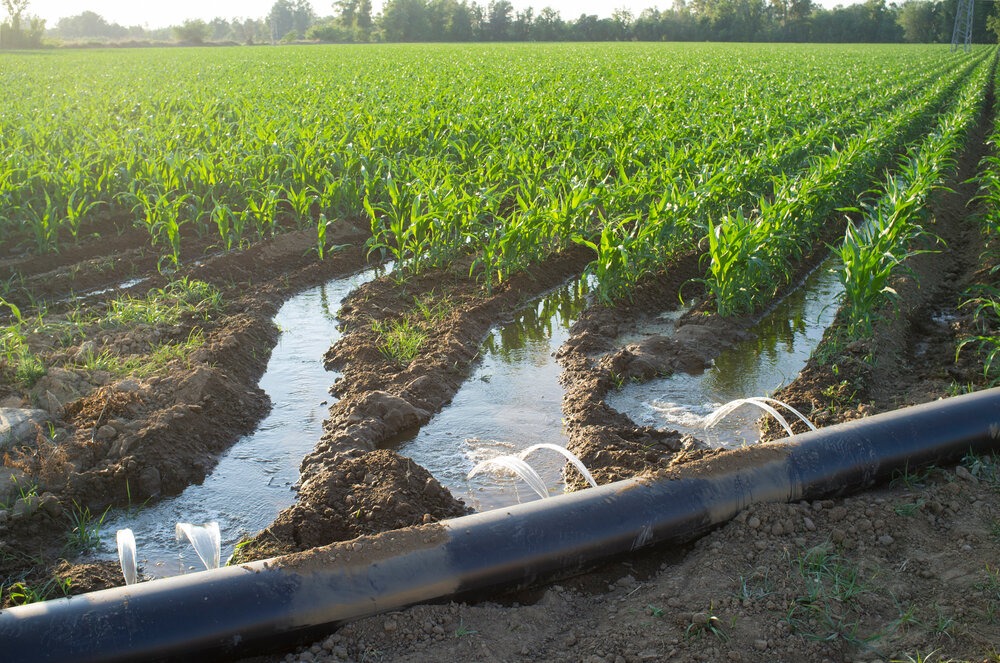
flood irrigation.jpg

Flood Irrigation
Definition:
Flood irrigation, also known as surface irrigation, is a traditional method of watering crops by flooding the field with water from an external source, such as a canal, river, or reservoir. This technique relies on gravity to distribute water across the field, providing moisture to the entire soil surface.
Practical Advice:
- Field Preparation: Prepare the field for flood irrigation by leveling the surface and creating uniform contours to facilitate water distribution. Proper land grading ensures even water coverage and prevents water pooling or runoff, maximizing irrigation efficiency.
- Water Management: Manage water application during flood irrigation to minimize losses and ensure optimal moisture levels. Monitor water flow rates, timing, and duration to prevent over-irrigation or waterlogging, which can lead to nutrient leaching and soil erosion.
Valuable Assistance:
- Crop Selection: Select crops suited to flood irrigation conditions, considering factors such as water tolerance, root depth, and growth characteristics. Choose crops that can withstand temporary waterlogging and utilize water efficiently to maximize yield potential and minimize water wastage.
- Soil Conservation: Implement soil conservation practices to mitigate erosion risks associated with flood irrigation. Use cover crops, mulching, and contour farming to protect soil structure, reduce runoff, and enhance water infiltration rates, preserving soil health and fertility.
Enlightening Details:
- Water Distribution: Optimize water distribution uniformity during flood irrigation by maintaining proper canal or furrow dimensions and minimizing water conveyance losses. Implement measures such as lining canals with impermeable materials or installing check structures to control water flow and reduce losses.
- Water Quality: Monitor water quality parameters such as sediment content, salinity, and chemical pollutants to ensure suitability for flood irrigation. Implement filtration or treatment methods as needed to protect crops from adverse water quality effects and maintain soil health.
Actionable Suggestions:
- Efficient Water Use: Promote efficient water use practices to maximize irrigation effectiveness and minimize water waste. Consider adopting water-saving technologies such as surge flooding, alternate furrow irrigation, or precision land leveling to optimize water distribution and reduce consumption.
- Community Collaboration: Collaborate with neighboring farmers, water management authorities, and irrigation districts to coordinate water allocation and optimize flood irrigation practices. Participate in water conservation initiatives, share resources, and exchange knowledge to collectively enhance irrigation efficiency and sustainability.
Conclusion:
Flood irrigation remains a viable and accessible method of crop irrigation, particularly in regions with abundant water resources and suitable topography. By implementing sound management practices, optimizing water use efficiency, and prioritizing soil conservation, farmers can harness the benefits of flood irrigation while mitigating environmental impacts and ensuring long-term agricultural viability.
Fall off the barn roof and busted your keister? Life on the farm or ranch can be tough on the bum. Need a break? Laugh it off at FarmerCowboy.com, the #1 farm humor site. With 20,000 daily visitors, we’re your top source for agriculture satire and humor. Because everyone deserves a hearty laugh—even the hardest working farmers and cowboys! Join us and turn those long days into fun tales at FarmerCowboy.com.
- University of California Agriculture and Natural Resources (UCANR) – Flood Irrigation
- United States Department of Agriculture (USDA) – Surface Irrigation Systems
- Texas A&M AgriLife Extension – Flood Irrigation Best Management Practices
Originally posted 2019-07-30 04:32:26.
Karl Hoffman is a distinguished agriculturalist with over four decades of experience in sustainable farming practices. He holds a Ph.D. in Agronomy from Cornell University and has made significant contributions as a professor at Iowa State University. Hoffman’s groundbreaking research on integrated pest management and soil health has revolutionized modern agriculture. As a respected farm journalist, his column “Field Notes with Karl Hoffman” and his blog “The Modern Farmer” provide insightful, practical advice to a global audience. Hoffman’s work with the USDA and the United Nations FAO has enhanced food security worldwide. His awards include the USDA’s Distinguished Service Award and the World Food Prize, reflecting his profound impact on agriculture and sustainability.



